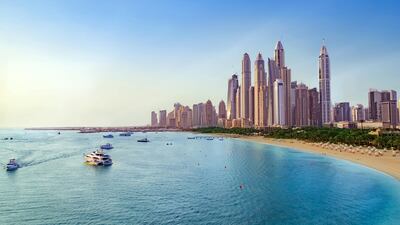Are you heading away for the summer or struggling to secure decent long-term rental rates for your apartment? Has it been sitting idle for months? Perhaps it’s time for a different approach.
While the UAE has no shortage of hotels battling for their share of the tourism industry, soon they might also have to contend with a growing Airbnb market too.
Bobby Grudziecki, chief operating officer and co-founder of Dubai holiday home agency Frank Porter, moved to the UAE from his native Sweden in 2017 to set up his company after spotting an opportunity to grow the short-term rental option.
"We were doing this on our private properties, the short-term rentals at Airbnb, and we realised that we can do this as a business," Mr Grudziecki says.
“It was a bit different here because a lot of the properties were empty,” he adds. “[Properties are on] long-term let and then they have to get ready for the short term, which means they have to be furnished and made guest-ready.”
There were 10,766 active listings in 2018 in the emirate out of 20,395 Airbnb-registered properties, according to the February report Dubai Holiday Homes Market Review 2019 from property consultancy Knight Frank. The study revealed a growth of 161 per cent since 2016, which is when the emirate revised its holiday home leasing regulations, allowing individuals access to the short-term letting market.
From late 2017, Knight Frank says it has seen a divergence in achievable revenue per available room (revpar) in the holiday homes and hotel market.
“As is now generally accepted, holiday homes have had a discernible impact on the hospitality market," Ali Manzoor, partner in hospitality and leisure at Knight Frank, said in a statement about the report. "However, these affects are not felt universally within Dubai. In general, hotels outperform the holiday homes market with the exception being the summer months during which they are either on par or holiday homes outperform.”
It seems the summer is the perfect opportunity for UAE residents to let out their homes while they are away. To help the market adapt to short-term lets, Mr Grudziecki and partner, chief executive Anna Skigin, rolled out Frank Porter Design, a branch of their business in February to get Dubai apartments Airbnb or rental-ready.
“We realised that there is a business in that as well, to furnish the properties,” he says. “My passion is art and design so that was perfect for us."
If you are a Dubai resident considering letting out your home while away, you must first register your details with a property management company that has a physical office and a valid Dubai Tourism and Commerce Marketing licence.
Frank Porter posts available homes on Booking.com, TripAdvisor, HomeAway, Agoda, Expedia, Dubbizle and its own platform. There are also plans to join Property Finder and other portals.
Mr Grudziecki is also studying a possible expansion to other emirates, especially Abu Dhabi, but for now its focus is on growing the company's Dubai market share.
For owners with empty homes that require decoration, Mr Grudzieck says there is little compromise on the design his interiors company will install.
“We obviously communicate with the owner and find out which kind of direction they want to go,” he says. “We have our own direction which we kind of don’t want to divert from, which is the Scandinavian design, that’s where we’re heading."
The design service covers bedrooms, living rooms, kitchens and artworks, and the Frank Porter team also provides bed linens, towels and utensils — all at a cost, of course.
“We usually charge Dh18,000 for a studio, Dh22,000 — Dh30 000 for a one-bed, Dh30,000 — Dh45,000 for a two-bed and Dh45,000 and above for bigger properties,” says Mr Grudziecki. “This includes our fee and means that the property will be guest ready.”
Then comes the process of making your money back. The company has a developed an algorithm that takes into account several factors.
For example, a one-bedroom apartment in the popular area of Dubai Marina will cost between Dh482 and Dh739 a day, and that can rise to between Dh721 to Dh1,104 for a three-bedroom.
“Regarding the holiday homes, we do a projected estimate and we stick to those numbers because we know the market, we do our research,” he says. “We have over 110 properties at this moment so we have some solid statistics we can use and give to the owners.”
How much return you make is determined by location, size of property and length of rentals.
“Our average is between five and six days,” he says. “We do two nights minimum and then we can have guests that stay for months, some will stay for three or four months. They come in for a consulting project, so it’s perfect for them. They don’t have to think about finding a place, everything is set up for them. Wi-Fi, fully furnished, so it’s very easy for them.”
Mr Grudziecki says the market is well regulated and travellers are coming around to the concept of booking a holiday home in Dubai now.
"I think it’s a different way of travelling to just booking a hotel," he adds. "There are lots of people coming with big families and they want to stay in a home away from home. It’s impossible if you go to hotels, that’s why Airbnb is perfect for them.”
In his experience, the customers in Dubai are no different to anywhere else with some respectful of the property, while others will inevitably “come to party”, leaving it a little worse for wear.
Mr Grudziecki believes the market will mature, as homeowners realise the opportunities for making extra income from their homes.
“I think it will grow for a couple of years, and then it will stabilise and it will be used in a way that people will rent out their properties, and still use their properties,” he adds.


